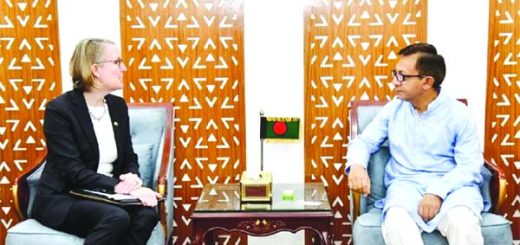Border crisis with Myanmar Possibilities and options for Bangladesh

Bangladesh has had a convivial and neighbourly relation with Myanmar since its independence. However, the friendship has occasionally been interrupted with some insurgent crisis, border skirmishes, and illicit trade issues. In this list, no issue has been graved as Rohingya influx, which started just after few years of the independence of Bangladesh. Recently, Rohingya crisis has become even more complicated with heightened counter-insurgency operatives of the Myanmar army in Arakan State bordering Bangladesh. The Myanmar army has violated the airspace of Bangladesh several times and fired mortar shells into Bangladeshi territory, resulting in a resurgence of tension along the Bangladesh-Myanmar border. Although Myanmar’s ambassador claims that the firing was inadvertent and was caused by the Arakan army. Many analysts assert that Myanmar intends to provoke Bangladesh into a war by committing such acts.
The dominant narrative of Rohingya crisis in Myanmar’s Arakan State focuses on communalism and human rights violations. The Rohingya people have been denied citizenship in Myanmar since a law was passed in 1982. They ended up becoming a group of people without a state to call home. For decades, the Rohingyas have been subjected to oppression at the hands of the Myanmar army, and this persecution has only intensified in recent years. Besides the human rights narrative, there is a big geopolitical game being played at this seemingly insignificant theatre of Myanmar, which connects South and East Asia geographically and splits global east and west politically. Both China and Russia put their bet on sovereignty to spare Myanmar of western approach of liberal internationalism. Using this leverage from two big powers, Myanmar authority could carry on its communally charged discriminatory measures and persecution against Rohingya community, which worsened the crisis since 2017. In August of 2017, hundreds of thousands of Rohingyas began to seek refuge in Bangladesh. Approximately 1.2 million Rohingyas are currently residing in Bangladesh as refugees, and 4,500 more are awaiting the opening of the border in no man’s land. China’s interest in this issue is multifaceted. China has increasingly exerted pressure on Bangladesh not to join the Quad (the Quadrilateral Security Dialogue). Some analysts believe this could be a message from China that they can exert influence on Bangladesh through the Myanmar border.
Meanwhile, Bangladesh was bracing up itself to start the repatriation of the Rohingyas through diplomatic channels, which seemed to be in the right course until border tensions emerged again. It is perceived that the recent escalation of tensions on the border is motivated by a desire to thwart Bangladesh’s intention to repatriate the Rohingyas to Myanmar. In addition, this process will aid Myanmar’s efforts to push the remaining Rohingyas into Bangladesh. Secondly, the internal conflict of Myanmar with several insurgent militant organizations has contributed to its desire to exacerbate border tensions with Bangladesh. Since the country’s independence, ethnic militancy has been an extremely prevalent occurrence in Myanmar. A recent coup d’état in 2021 and anti-coup protests have further accelerated the insurgency. In such a situation, Myanmar could intentionally provoke Bangladesh to create a warlike situation on the border to shift world attention from their internal conflict to the border tensions. Thirdly, the maritime dispute also contributed to tensions arising between Bangladesh and Myanmar. In 2008, the Bangladesh Navy and the Myanmar Navy were engaged in a naval standoff over disputed territory in the North-Eastern Bay of Bengal. After the International Tribunal for the Law of the Sea made its final verdict in 2012, Bangladesh was granted 111,000 square kilometers of water in the Bay of Bengal. However, Myanmar is still provoking the issue through different instigating actions, such as adding the Saint Martin Islands to their map.
However, Myanmar’s repeated violations on Bangladesh’s land and airspace have compelled policymakers, diplomats, and the Bangladesh government to reconsider the country’s strategic interests. Steps have been taken to denounce the incidents diplomatically, which goes on to forebode the repercussions these incidents could have on the future of the Rohingya crisis. While Bangladesh’s political maturity is laudable in that it has resisted the Myanmar military’s provocations and is acting with extreme restraint, it is imperative that the government carefully and critically scrutinize the most recent development to comprehend the causes of such incidents. As the number of victims and casualties of the mortar explosions in Bangladesh keeps piling on, the chances of a successful implementation of the Rohingya Repatriation Agreement between the two countries keep diminishing. While in the past, tensions were reduced by some diplomatic efforts, it appears that this time, even formal complaints are insufficient to convince the Myanmar regime to stop the shooting rampage along the border areas. Bangladesh is also facing the economic consequences of recent border tensions. Trade data shows that over the past 1.5 months, both imports and exports through the Teknaf land port have drastically decreased as tensions along the Bangladesh-Myanmar border rise. In July, Bangladesh imported 20,500 tonnes of commodities via the port. In August, the amount decreased to 17,318 tonnes, and in the first 26 days of September, it dropped to 13,580 tonnes. In addition, exports dropped from 400 tonnes in July to 320 tonnes in September.
According to a statement by the home minister on September 17, now the Bangladeshi government may need to bring this matter before the UN. Having said that, it would be too optimistic for Bangladesh to expect assistance from the UN or other regional forums in stopping Myanmar from taking such aggressive measures as a major number of countries have their respective investments in Myanmar. Both India and China, two of Bangladesh’s neighbouring countries, have invested in the Rakhine region of Myanmar, which implies that it would be tantamount for Bangladesh to ask for help or not from either of the two countries in this regard. Though the UN has asked the member countries to eschew supplying military assistance and engaging in any arms treaties with Myanmar, the question remains how many of the countries will adhere to this call as countries like Russia and North Korea, which share a pendulous relationship with the UN, are involved in the arms trade with Myanmar.
It is unfair how Myanmar is acting in a way that violates international law. The possibility of the current conflict growing into a more significant one also exists. Because of this, we need to try to stop it right now. The issue must be resolved in a non-violent manner. Neither Bangladesh, nor Myanmar can bear the cost of war right now. So, as a short-term solution, multiple session of exchanging views can be initiated by the policymakers of Bangladesh with the major patron countries of Myanmar, such as China. Bangladesh can expect some help from some member countries of ASEAN as the recent incidents were condemned by the member states, and previously, the Myanmar generals were barred from attending the 55th ASEAN Foreign Minister’s Meeting in Phnom Penh. As a long-term solution, Bangladesh and Myanmar can deepen their economic relations, which may create room for dialogue on other unresolved issues. However, because of the struggle for democracy of Myanmar, deep economic relations alone may not be enough. So, as a symbol of goodwill, Bangladesh’s military can also offer cooperation to deal with so-called extremist groups which are operating near borders. In other words, Bangladesh’s current strategic plan should include a multifaceted strategy of interaction with the Myanmar administration to resolve all the security concerns.
(The writer is Associate Professor, Department of Peace and Conflict Studies, University of Dhaka).





